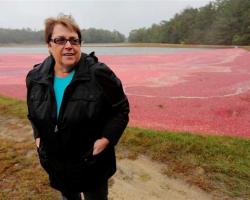AMHERST, Mass. – This fall faculty and staff from the University of Massachusetts Amherst are presenting educational programming at the new Boston Public Market (BPM), a 28,000-square-foot, self-sustaining market featuring all locally sourced food.
The market, which opened July 30, is the first of its kind in the nation and offers products that are produced or originate from New England.
UMass Amherst is one of 10 official BPM launch partners to provide educational programming, and is the first academic institution to partner with the market. Participating faculty and staff will present in BPM’s demonstration kitchen, a community engagement area that offers classes, workshops and events.
Presentations will include:
“All About Apples” with Wesley Autio, professor and director of the Stockbridge School of Agriculture, Thursday, Oct. 22, 6:30-8:30 p.m. A pomologist, Autio is an expert on the orchards of Massachusetts and the apples grown here. He is interested in the history of the fruit in Massachusetts and speaks on early varieties in the colonial era, a topic of interest to the apple-loving public.
“Cranberries—History, Sustainability and New Uses” by Carolyn DeMoranville, extension associate professor and director of the UMass Cranberry Station in Wareham, Saturday, Nov. 7 from 3-5 p.m. An expert on the cultivation of cranberries, DeMoranville is the second generation of her family serve as director of the UMass Cranberry Station, after her father, Irving DeMoranville, held the position in the 1980s and ’90s. She will speak about the history of the cranberry as a food crop from pre-European Massachusetts to the present, with attention to present day environmental sustainability issues and expanding uses of the fruit.
Screening of the documentary “Raising Shrimp,” co-produced by Andy Danylchuk, assistant professor of environmental conservation, Thursday, Dec. 17, 6:30-8:30 p.m. The film explores why our food come from so far away? Shrimp is the most popular seafood in the United States, where more than one billion pounds are consumed each year. But 90 percent of it is imported, and most of that is farmed not wild caught. What are we really eating, and is it our only choice? How do they farm shrimp? Is it safe to eat? What happened to the American shrimp fishery? What could a more local shrimp mean for our health, and the health of our nation? Is such a thing even possible?
Chef demonstration by UMass Amherst Dining Services, Saturday, Dec. 20, time to be announced.
The Boston Public Market is located at 100 Hanover St. in downtown Boston.
